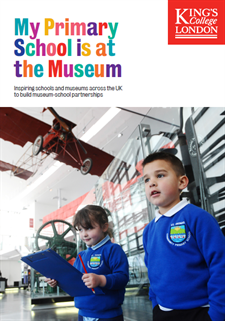Children gain confidence and social skills when schooled in local museum

A new report, published today by King's College London, shows the findings of four projects that for the first time in the UK placed Nursery, Key Stage 1 and Key Stage 2 children in their local museum for extended residencies. The groups undertook many of their daily lessons and activities at their local museums for a period of between two weeks and up to a full term.
Against a backdrop of threatened museum services and shortage of nursery and primary school places, the project was designed to explore the radical concept of co-location. The findings are also pertinent to the debate about how schools can nurture creative, flexible and confident thinkers at the same time as ensuring children are ready for tests and exams.
While it is recognised by most that cultural learning experiences benefit children, the current model remains one of infrequent day trips that, for many schools, have been reduced in recent years due to financial challenges. Crucially these pilots tested the hypothesis that the national curriculum could be satisfactorily delivered in a museum setting and the findings demonstrate that not only is this possible but that the resources of a museum have the ability to enhance and enrich that delivery, suggesting that the co-location model has the potential to revolutionise education.
The key findings are:
- Children became more confident and effective communicators, developing new social skills.
- The pilots fostered deeper relationship between schools and parents, contributing to greater community cohesion with parents actively supporting the projects and visiting their local museums for the first time as result.
- Children enjoyed memorable learning experiences with the potential for greater learning retention.
- The immersion of children in museum and gallery collections led to a growing enthusiasm for the opportunities that their local cultural organisations can offer.
- Museums developed their understanding of formal education audiences and extended their use of their spaces and collections.
- Teachers became more confident in using out-of-the-classroom resources, in a creative way, to deliver much of the curriculum.
The pilot projects did demonstrate some challenges around understanding between the partners and the logistics of running a school programme in a non-school building. These findings will inform future collaborations and recommendations.
Following the publication of the report, King's College London makes a number of key policy recommendations, namely:
- Support for extended school residencies in cultural settings.
- Dissemination of the evidence for using cultural resources in education.
- Specialist training for teaching in museums, heritage and cultural organisations.
- The creation of a practical toolkit for organisations interested in cultural residencies.
- More exploration of potential partnerships and development of networks to share best practice and opportunities for co-locating schools and museums.
Katherine Bond, Director, Cultural Institute, King's College London said, 'The project findings will inspire schools and museums across the UK and contribute to the debate around creative and cultural learning. We hope that the pilot projects will lead to new models for the delivery of the national curriculum and that extended school residencies in local museums eventually become part of every child's education.'
Wendy James, Architect and Partner at Garbers & James Architects, who conceived the project and helped to co-ordinate the pilots commented, 'As an architect with a background in learning and museums and as a mother of three children, I've long felt that the synergy between the two sectors could have benefits for everyone. It was wonderful to witness the children's growing sense of ownership of their local museums and to know that longer term partnerships were formed. I hope that the project can develop and one day come to complete fruition in the establishment of the UK's first co-located Museum Primary School.'
More information: For more information on My Primary School is at the Museum, including the report, visit: www.kcl.ac.uk/SchoolsInMuseums
Provided by King's College London



















